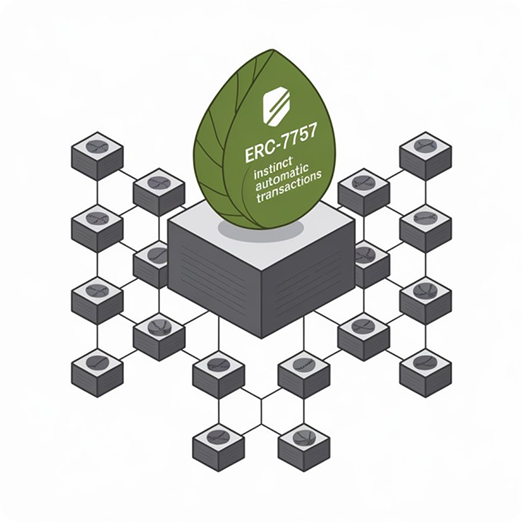ERC-7757- Instinct-Based Automatic Transactions on the Ethereum Blockchain Using AI Agents

Understanding ERC-7757: The Core Concepts
Instincts and Temptation Values
At the heart of ERC-7757 lies the concept of "instincts," which are predefined or dynamically generated goals that guide AI agents in making decisions. These instincts represent the final targets that the AI aims to achieve, whether it's executing a transaction, triggering a smart contract, or performing any other blockchain activity. Along the path to these final targets, mid-way targets are generated, each carrying its own "temptation value.
The temptation value acts as a metric, indicating how compelling or rewarding it would be for the AI to pursue a specific mid-way target. This creates a dynamic, adaptive system where transactions are carried out efficiently based on real-time analysis of potential outcomes. Here's a breakdown of these core concepts:
- Final Targets:These are the ultimate objectives that the AI agents aim to achieve, such as the completion of a transaction or contract.
- Mid-Way Targets: These interim goals guide AI agents along the path to the final targets, allowing for adjustments based on real-time conditions.
- Temptation Values: Each target has a temptation value that quantifies the incentive for AI agents to pursue that target. This dynamic approach allows the system to adapt to changing circumstances and optimize transaction execution
AI-Driven Transactions
The integration of AI into the blockchain through ERC-7757 enables a more autonomous and intelligent system. AI agents, guided by instincts and temptation values, can autonomously initiate transactions without human intervention. This could range from trading tokens to adjusting smart contract parameters or reallocating resources in a decentralized finance (DeFi) ecosystem.
The AI's decisions are driven by the instinct model, which continually assesses the environment, adjusting its actions based on the temptation values of various targets. This self-regulation ensures that the blockchain ecosystem remains balanced and optimized, as the AI works towards maximizing rewards while minimizing penalties
Automatic Execution of Transactions
One of the standout features of One of the most compelling features of ERC-7757 is its capability for automatic transaction execution. When the conditions for either an instinct or a mid-way target are met, the associated transaction is executed automatically, without the need for manual intervention. This automation is particularly beneficial in scenarios where speed and efficiency are critical, such as in financial markets or decentralized finance applications.
Potential Use Cases for ERC-7757
Decentralized Finance (DeFi)
In DeFi, ERC-7757 could enable AI-driven liquidity management, where AI agents automatically reallocate assets across different pools to optimize yields based on real-time market conditions. This could also extend to automated trading strategies, where AI agents execute trades based on instinct-driven decisions, reacting to market trends and price fluctuations
Supply Chain Management
AI-driven transactions could streamline supply chain operations by automatically executing contracts and payments as soon as specific conditions are met. For example, the delivery of goods could trigger automatic payment transfers, reducing delays and ensuring transparency throughout the process
Autonomous DAOs
Decentralized Autonomous Organizations (DAOs) could benefit significantly from ERC-7757. AI-driven agents could autonomously manage the DAO’s operations, from voting on proposals to allocating funds, all guided by instincts that align with the organization’s goals
Creating a Self-Regulating Ecosystem
The ERC-7757 standard envisions a self-regulating and adaptive blockchain ecosystem. By allowing decisions and transactions to be made based on calculated rewards and penalties, the framework promotes a more efficient allocation of resources. This self-regulation can lead to several key benefits:
- Enhanced Efficiency: By automating transactions based on instinct-driven decision-making, the system can react more swiftly to market changes.
- Reduced Human Error: Automating transaction execution minimizes the risk of human error, which can lead to costly mistakes in fast-paced environments.
- Increased Adaptability: The dynamic nature of instincts and temptation values means that the system can adapt to new information and changing conditions, allowing for more resilient operations.
Challenges and Considerations
While the potential of ERC-7757 is vast, its implementation will need to address several challenges:
Security Risks
Introducing AI into blockchain transactions increases the complexity of the system, potentially opening up new vulnerabilities. Ensuring that AI agents operate securely and that instincts are not manipulated will be crucial
Ethical Concerns
The autonomous nature of AI-driven transactions could raise ethical questions, particularly around decision-making without human oversight. Establishing guidelines and ethical standards for AI behavior on the blockchain will be necessary
Integration Complexity
The integration of AI-driven instincts with existing blockchain infrastructure could be complex, requiring significant development and testing to ensure seamless functionality
Conclusion: A Step Towards an Adaptive Blockchain Ecosystem
ERC-7757 represents a significant step towards a more adaptive and intelligent blockchain ecosystem. By introducing AI-driven automatic transactions, guided by instincts and temptation values, this standard could revolutionize how decisions are made and executed on the Ethereum blockchain. While challenges remain, the potential benefits of a self-regulating, autonomous system are immense, paving the way for a new era of blockchain innovation.
As the blockchain community continues to explore and refine ERC-7757, it will be fascinating to see how this standard shapes the future of decentralized systems, potentially ushering in an era of AI-powered blockchain networks
